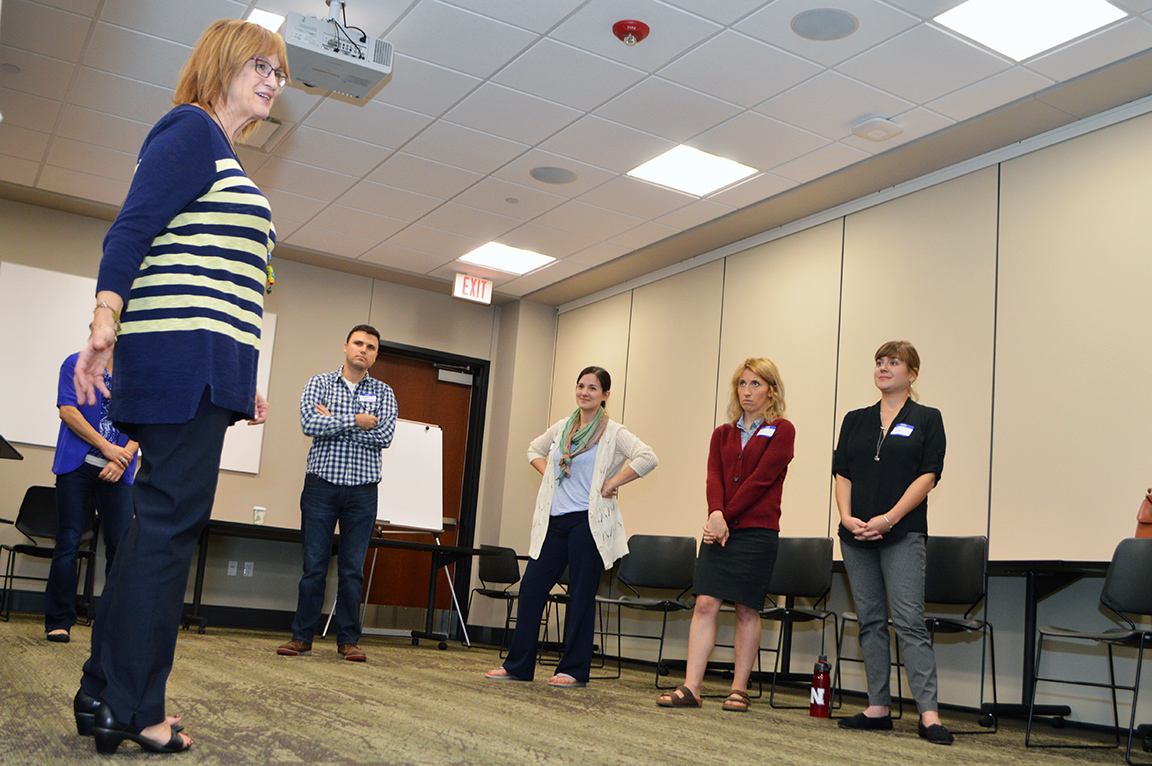
Science not communicated is science not done.
The words screamed silently from SciComm keynote speaker Melissa Marshall’s PowerPoint presentation. They were the only words on the slide and were the ones the TED speaker tried to hammer home.
About a month later, Carol Schindler, improvisational instructor with the Alan Alda Center for Communicating Science, told a crowd of attendees at a science communicator’s workshop at Nebraska Innovation Campus, “The heart of science is being able to communicate it.”
Both workshops’ had the goal of helping scientists across all fields better communicate what they do: for the better good and for the scientists themselves. The School of Natural Resources co-sponsored the Alan Alda workshop in mid-October, which six SNR professors or doctoral students attended. A similar number attended the earlier SciComm conference in late September.
All walked away with tools better to distribute and communicate their science.
“Keep it simple, but accurate,” said James Rae, workshop instructor for the Alda workshop. “Simple is no less accurate and no less true, but it is speaking in a way that is clear. Remember, if the goal is to understand your work, then accuracy means you are hitting the target -- it doesn’t have to be the bullseye.”
Rae and Marshall emphasized that scientists often get bogged down in the specifics, “spraying information” at an audience that may or may not understand the technical terminology associated with ones’ field. Instead, they both said, remember to bob up and down from points of common ground or knowledge to the specific, technical details. This keeps audiences of different technical backgrounds engaged.
Passion helps, too.
“Anytime you can infuse passion, people will ride a little bit longer,” Rae said. “Create a connection and you’ll find it’s hard to fail.”
Marshall said presenting science powerfully requires mastery of three skills:
• Be audience centered: How is your science relevant to my life?
• Filter and focus your work: What is the main message you want the audience to leave the room with? And what does the audience need to know in order to reach that point?
• Show your science: Use primarily visual slides; audiences go into cognitive overload when trying to listen to a speaker and read dense slides at the same time. “People learn much more deeply from words and relevant images than from words alone,” Marshall said.
In the Alda workshop, participants used improvisational exercises to strengthen these skills. (View examples of Improv for Scientists here.) They took turns trying to explain cell phones and X-rays to their partners fictitiously from the Middle Ages. In each round, they came back more animated and more engaging, connecting and focusing on their listeners.
But why is it so important?
“Nowadays, it’s key for people to understand what science is about,” Schindler said. “The burden of communication is on the communicator.”
Clear communication can drive media to cover scientific discoveries; it can lead to earning grants, especially NIH and EPA ones that have elevated the importance of common language in proposals. It helps explain to taxpayers and legislators why the work being done is important and necessary, and why universities, departments and colleges need state-funded dollars for research.
Maybe most importantly, it gives the curiosity behind science space to grow.
Miss the events?
SciComm 2016 has made all PowerPoint presentations available on the Digital Commons site. Videos of presentations will be available here in the future.
Learn more about Alan Alda Center for Communicating Science here.
Sponsors
University of Nebraska-Lincoln and the Institute of Agriculture and Natural Resources has put an emphasis on communication through its science literacy program, said Cory Forbes, science literacy coordinator at SNR. IANR contributed to both science communication workshops.
The Science Literacy Initiative; Department of Agronomy and Horticulture; NebraskaScience; BioChemistry; SNR and Nebraska Extension also were co-sponsors for the Alan Alda event.
For a complete list of SciComm sponsors, visit http://nescicomm.com/.
Shawna Richter-Ryerson, Natural Resources
More details at: http://snr.unl.edu